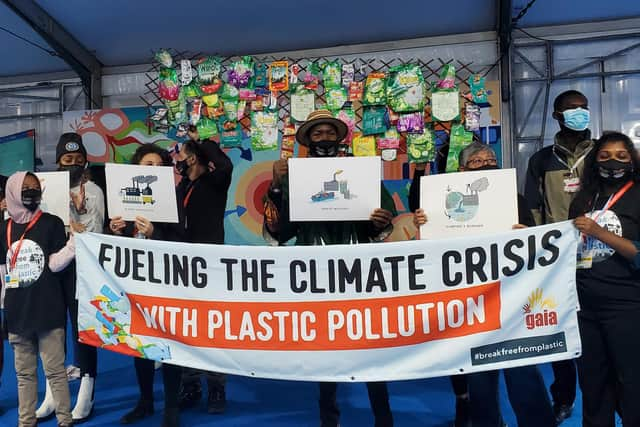COP26: Call for 'aggressive' action to tackle plastic pollution as beaches in Bermuda and other islands swamped by foreign litter
Walter Roban, deputy premier and home affairs minister for the UK overseas territory, says Bermuda, which is known for its spectacular beaches, is being blighted by litter from the US and elsewhere, which is washing up on the island nation’s shores.
The minister, who has been in Glasgow to represent Bermuda at COP26, says developed countries are the biggest generators of waste plastic, but the impacts are being felt much further afield and are having devastating consequences for the environment and human health.
Advertisement
Hide AdAdvertisement
Hide AdAnalysis of debris found around the Bermuda coastline shows the vast majority is not of local origin, but is being transported from other places, particularly the US.
“The main issue for us is that plastics thrown as waste in large countries like the United States and others are getting into the ocean and then finding themselves on our shores and on other islands,” he said.
“Plastic washes up on our beautiful beaches all the time and it’s not plastic that is disposed of in Bermuda, but elsewhere.
“We hope the US and other large countries aggressively address the issue of disposal of single-use plastics to solve what is a global ocean problem that we see every day in Bermuda.”


Bermuda is one of 14 UK Overseas Territories, which are the last remains of the British Empire and include a fifth of the global marine estate.
The territories do not have a seat at the United Nations negotiating table at COP26, but are represented by the UK Government.
This year’s COP saw officials from a record six of the territories in attendance.
Bermuda, which chairs the United Kingdom Overseas Territories Association, is bringing in measures to outlaw single-use plastics from next year.
Advertisement
Hide AdAdvertisement
Hide AdMr Roban said: “We look forward to seeing what else the largest countries can do about disposal, handling and elimination of single-use plastics as Bermuda is doing.
“We are doing our part.”
The calls come as demonstrators staged a protest against the involvement in COP26 of one of the country’s biggest manufacturers of toiletries and household cleaning products.
Activists from the environmental campaign group Break Free From Plastic have hit out at the role of Unilever as a principal partner of the UN summit, condemning the company as a “top plastic and climate polluter”.
Campigner Nikki Reisch, from the Center for International Environmental Law, said: ”Plastic is fossil fuels in another form, and plastic pollution is fuelling the climate crisis.
“The only way to reduce emissions from plastic is to make less plastic.”
Unilever is behind big-name brands such as Persil, Domestos, Lynx, Dove, Sure, Surf and Simple.
In its 2021 Global Brand Audit report, Break Free From Plastic ranked Unilever in third place among the companies creating the most plastic pollution, following Coca-Cola Company and PepsiCo as the top two for the fourth year in a row.
Estimates suggest around 12 million tonnes of waste plastic ends up in global oceans each year, where it poses a significant risk to the marine environment.
Advertisement
Hide AdAdvertisement
Hide AdIt causes the deaths of around 100,000 marine mammals and turtles and one million seabirds annually.
A message from the Editor:
Thank you for reading this article. We’re more reliant on your support than ever as the shift in consumer habits brought about by coronavirus impacts our advertisers.
If you haven’t already, please consider supporting our trusted, fact-checked journalism by taking out a digital subscription.
Comments
Want to join the conversation? Please or to comment on this article.
